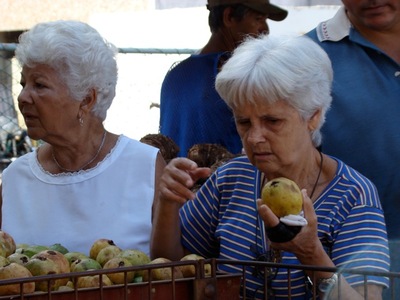When I was little and the vital underpinnings of the Cuban economy came from the Kremlin, my mother made me eat all my food. The phrase she used to get me to clean my plate was, "Don't leave even a spoonful, there are other children in the world who have nothing to put in their mouths." Barely ten years passed and the deep crisis generated by the fall of socialism in Eastern Europe totally changed the panorama of my table. Instead of evoking those without, we started to ramble on about the succulent delicacies that were being devoured by others. There were times when we talked constantly of lost flavors and products that had disappeared from the market. My parents no longer begged me to improve my appetite, but rather took me task for wolfing down - much too fast - the bread we received from the ration.
The crisis came into our lives and didn't leave, like an unwanted visitor who arrives in the middle of the night and ends up sleeping in our bed. We grew up hearing the phrase "there isn't any," and when more than two people got together the talk revolved around food. To drink milk in the morning became a luxury, and to have a pair of pants without patches would make you the popular child in school. We learned to live with the minimum, and never like then was the desire to possess objects so sharp, to die like a fish - through the mouth - after stuffing ourselves.
This scenario of shortages and nostalgia was diminishing our capacity to be alarmed about one more announcement of some crisis. On TV they talked about the so-called "Zero Option" which would require that an enormous pot would be provided in each neighborhood from which the minimal daily ration would be distributed. Instead of being terrified, we decided to plunge into lawlessness and the black market, to make rafts to cross the Straits of Florida, or to urgently beg relatives in exile to send money. The numbers always in the red, the shortages and negative forecasts, became an inseparable part of our lives, essential components of everyday life in Cuba.
After more than twenty years of living with a collapsed economy, our skin barely reacts to the stings of difficulty. The world is frightened by the indicators that show disaster, while we continue with our empty sacks left to us by the dismemberment of the USSR. A new generation, born since the rigors of the famine, can not conceive of making long term plans, of waking up in the morning without having to face the eternal question, "What am I going to eat today?"
The official press shows us the financial meltdown battering the world today, but most people shrug their shoulders with a certain apathy. There's nothing we don't already know about the rigors of the crisis, the tremendous consequences of a sinking economy. The analysts warm that it could mean the end of a system, but we are the survivors of the agony of another one, so we do not fear the death throes. Many of us have grown up with the rationed market what was announced, more than forty years ago, as a short term measure. We seen a leader announce worse times from the podium, and just a few months ago Raul Castro predicted we would have to tighten our belts, once again. With this long coexistence with financial problems and unmet needs, there is little left to rob us of our sleep.
Our experience living with the minimum will surely be of great use in the times ahead. We might have to grease the wheels of the bike, and walk up ten flights of stairs carrying two full buckets of water, due to the lack of electricity to work the elevator and jump-start the water pumps. We may have to dust off the incredible recipes from the worst of the "Special Period" - that time after the fall of communism abroad when we made "steak" from grapefruit rinds and "hamburger meat" from banana peels. It's possible that tourism will vanish because who in the world would pay money for an airline ticket and a week's stay in a hotel, with the entire informal market collapsing around our convertible currency. There is no reason to doubt that another migratory explosion could take place, with thousands of Cubans choosing to launch themselves on the sea on anything that floats. We mothers, meanwhile, will continue on NOT pushing our children to eat more, fearing that their appetites could engulf the entire family's ration.

